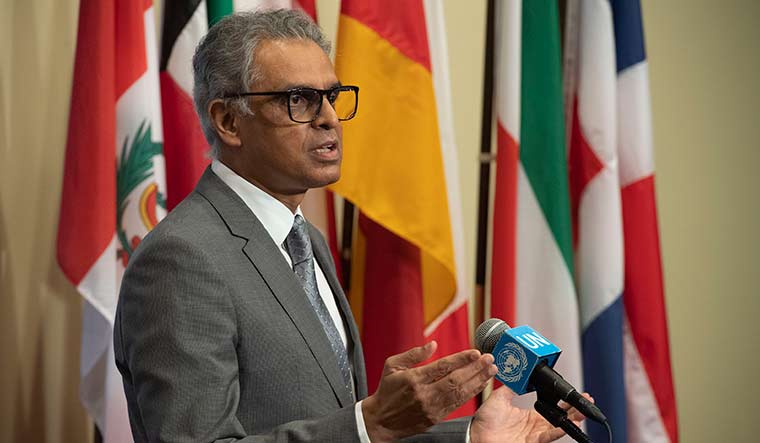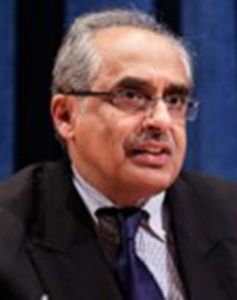ON AUGUST 16, 2019, the UN News website carried the following statement: “The Security Council considered the volatile situation surrounding Kashmir on Friday, addressing the issue in a meeting focused solely on the dispute, within the UN body dedicated to resolving matters of international peace and security, for the first time since 1965.” It stated that Pakistan had requested the meeting on August 13, and it was subsequently called for by permanent member China.
The item referred to an earlier statement by the UN secretary general Antonio Guterres on August 8 saying he was following the situation “with concern”, and that he had appealed for “maximum restraint” while recalling the UN position on the region as being “governed by the charter... and applicable Security Council resolutions”. The secretary general also recalled the 1972 Simla Agreement which said the “final status of Jammu and Kashmir is to be settled by peaceful means” in accordance with the UN charter.
What the news item did not mention was the fact that the Security Council president for the month, Ambassador Joanna Wronecka of Poland had, on receiving the Pakistani request, conducted consultations with all Council members and decided against holding any meeting. On further insistence by China, she had agreed only to “informal consultations” among members of the Council under “any other business” without “ any outcome” from the meeting. This is a practice the Council has followed on many other issues like developments in Myanmar where agreement on a formal meeting could not be reached between members. Also, in this case, despite insistence by China, with support from the UK for an agreed “press brief”, no agreement on any such brief on behalf of the Council president or “all of its members” was possible. What followed were individual country briefings by Pakistan, China and, of course, by India.
At the UN, no issue brings out as much adrenaline from Pakistan as the issue of Jammu and Kashmir. Over decades, Pakistan has spared no occasion, however tangential, to raise it in the Council, in whatever form. Pakistan argues that the situation in Jammu and Kashmir remains on the UN agenda and that it continues to threaten peace in the region as does India's denial of human rights to the predominantly Muslim population there.
When I was ambassador in New York (2002-2004), Pakistan's ambassador Munir Akram, within months of his arrival as permanent representative, began to rake up the issue. By April 2003, he was able to convince the Mexican permanent representative ambassador Adolfo Aguilar Zinser as Council president to initiate consultations in this direction. As permanent representative then, I was forced to take active measures with all members to foil this mischief.
These efforts had to be complemented by vigorous moves in the capitals of member states and finally, it was only with the able support from the then Russian permanent representative ambassador Sergey Lavrov (now Russia’s foreign minister) that a bid for an “Arria-formula [an informal method of consultation first proposed by ambassador Diego Arria of Venezuela in 1992] meeting” to discuss Jammu and Kashmir was squarely foiled. Then, too, Pakistan had enjoyed the vigorous support of China.
The present informal discussion by the Security Council, though “without outcome”, could mean a breakthrough of sorts for Pakistan, if allowed to be used by it or China as a precedent for further consideration of issues relating to Jammu and Kashmir. The reactions within the territory to the Central government action in abrogating Article 370 are just beginning. It is not clear how the people in the valley will react in the coming weeks and how this will impact future decisions of the Indian government both on law and order, governance, economic development or even on the coming elections in the Union territory. By starting even informal consideration of the situation in the Council, China has what it would call in the board game of weiqi, a xian shou or upper hand. Prime Minister Narendra Modi will do well to remember this when he engages with President Xi Jinping in the coming months. Apart from ensuring the return of normalcy to Jammu and Kashmir, he will need to do something to neutralise China's advantage.
Meanwhile, US President Donald Trump’s tweets regarding the events in Hong Kong could cause some headache to China. UN Secretary General Guterres has shown singular reluctance to ruffle China, even while speaking loudly on human rights issues around the world, including in Myanmar. The UK and the US may need to step up to the plate and remind China of the need to brush up its own image and avoid any precipitate action against nonviolent protestors in Hong Kong and to exercise “maximum restraint”. On his part, Modi can remind China to heed its own homilies to India to avoid "unilateral action" on changing the status quo in its own territories, including Hong Kong, and more so in the Trans-Karakoram tract illegally ceded by its "all-weather friend" in the past.
The author was Indian envoy to the UN, China and Pakistan and deputy national security adviser.



